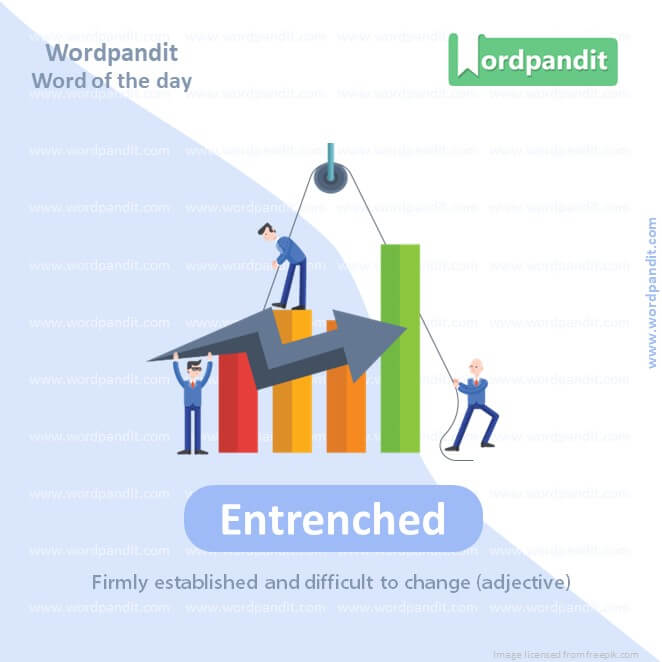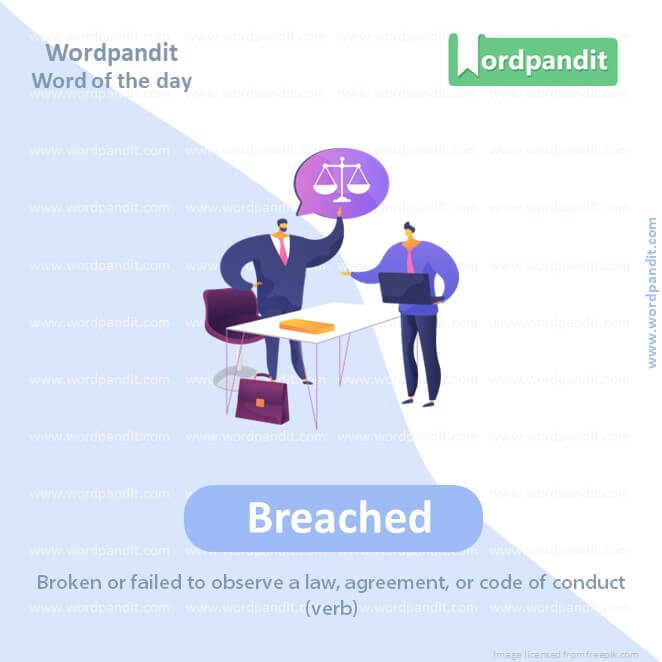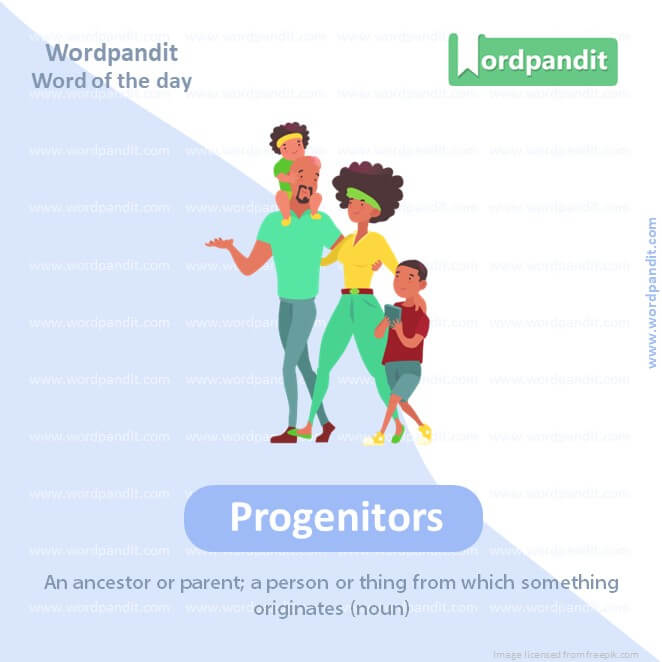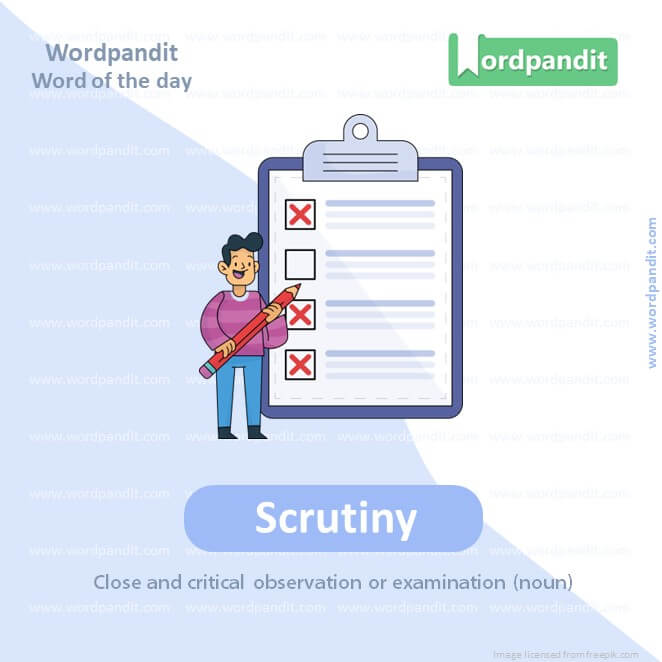Daily Vocabulary Words: List of Daily Used Words
Hi there. Welcome to this special section @ Wordpandit.
Our endeavour here is straightforward: highlighting important daily vocabulary words, you would encounter in The Hindu. This is your repository of commonly used words; essentially, we are posting a list of daily used words. Hence, this has significant practical application as it teaches you words that are commonly used in a leading publication such as The Hindu.
Visit the website daily to learn words from The Hindu.

WORD-1: Entrenched
CONTEXT: Some key items are seeing deeply entrenched inflation trends — double-digit inflation has now been seen for five months in vegetables, 10 months in pulses and a whopping 22 months in spices.
SOURCE: The Hindu
EXPLANATORY PARAGRAPH: Imagine a big castle with high walls and a deep moat around it. The castle is so strong and secure that it’s nearly impossible for anyone to get inside. That’s what “entrenched” means—something that’s firmly established and difficult to change.
MEANING: Firmly established and difficult to change (adjective).
PRONUNCIATION: en-TRENCHD
SYNONYMS: Established, ingrained, rooted, fixed, settled, entrenched
USAGE EXAMPLES:
1. The company’s policies were deeply entrenched and resistant to change.
2. His beliefs were so entrenched that he refused to consider any other viewpoint.
3. The tradition of celebrating New Year’s Eve with fireworks is deeply entrenched in our culture.
4. The political system was entrenched with bureaucracy.
WORD-2: Tantalisingly
CONTEXT: A durable descent to its 4% target that has now been elusive for 54 months, remains tricky. For urban consumers, inflation eased tantalisingly close to the target in March at 4.14%, but it rose in rural India to 5.45% from 5.34% in January and February.
SOURCE: The Hindu
EXPLANATORY PARAGRAPH: Imagine a delicious cake sitting on a table, and you’re not allowed to eat it yet. It looks and smells so good that it makes you want it even more. That feeling of wanting something that’s just out of reach is what “tantalizingly” means.
MEANING: In a way that arouses desire or expectation but keeps something out of reach (adverb).
PRONUNCIATION: TAN-tuh-lie-zing-lee
SYNONYMS: Enticingly, alluringly, temptingly, seductively, invitingly, tantalizingly
USAGE EXAMPLES:
1. The aroma of freshly baked cookies wafted tantalizingly through the house.
2. She smiled tantalizingly, knowing she had a surprise for him.
3. The mystery novel ended tantalizingly, leaving readers eager for the next installment.
4. The store displayed its products tantalizingly in the window, drawing in passersby.

WORD-3: Breached
CONTEXT: It termed the decision illegal as Mr. Glas was facing cases in the country and, soon after, sent armed police officers to the embassy to arrest him, triggering a major diplomatic crisis. Mexico, which says its sovereignty has been breached, has now moved the International Court of Justice in the Netherlands, demanding the expulsion of Ecuador from the UN.
SOURCE: The Hindu
EXPLANATORY PARAGRAPH: Imagine a wall or a barrier that’s supposed to keep something out, like a dam holding back water. If there’s a hole or a break in that wall, allowing what’s kept out to come in, that’s called a “breach.” It’s like when rules or agreements are broken, allowing something to happen that shouldn’t.
MEANING: Broken or failed to observe a law, agreement, or code of conduct
(verb).
PRONUNCIATION: breecht
SYNONYMS: Violation, infringement, transgression, breach, break, rupture
USAGE EXAMPLES:
1. The data breach compromised millions of users’ personal information.
2. The breach of contract resulted in legal action against the company.
3. The breach in security allowed unauthorized access to the building.
4. Any breach of the rules will result in disciplinary action.
WORD-4: Marred
CONTEXT: Last year’s presidential election was marred by deadly violence when presidential candidate Fernando Villavicencio was assassinated during the campaign in Quito.
SOURCE: The Hindu
EXPLANATORY PARAGRAPH: Imagine drawing a beautiful picture, but then accidentally spilling paint on it. The paint marks make the picture look less perfect and not as nice as it was before. That’s what “marred” means—when something is spoiled or damaged, making it less attractive or enjoyable.
MEANING: Spoiled or damaged, making something less perfect or attractive (adjective).
PRONUNCIATION: mahrd
SYNONYMS: Spoiled, damaged, blemished, impaired, tarnished, flawed
USAGE EXAMPLES:
1. The otherwise perfect day was marred by heavy rain.
2. Her performance was marred by technical difficulties.
3. The beautiful painting was marred by a small tear in the canvas.
4. The joy of the celebration was marred by an argument among guests.

WORD-5: Apprenticeship
CONTEXT: Voters can legitimately ask how promising a higher minimum wage for Mahatma Gandhi National Rural Employment Guarantee Act (MGNREGA) workers or the right to apprenticeship or the right to health with cashless insurance of up to ₹25 lakh, reeks of divisiveness.
SOURCE: The Hindu
EXPLANATORY PARAGRAPH: Imagine you’re learning how to make a cake from a professional baker. You watch closely, help out, and gradually learn all the steps and tricks of baking. That’s like an “apprenticeship,” where you learn a skill or trade from someone who’s experienced.
MEANING: A period of time spent learning a trade or skill from a skilled worker
(noun).
PRONUNCIATION: uh-pren-tis-ship
SYNONYMS: Internship, training, mentorship, tutelage, education, apprenticeship
USAGE EXAMPLES:
1. He completed his apprenticeship and became a certified electrician.
2. The artist’s apprenticeship under a famous painter greatly influenced her style.
3. The company offers apprenticeships to young people interested in carpentry.
4. After her apprenticeship as a chef, she opened her own restaurant.
WORD-6: Envisaged
CONTEXT: The egalitarian pursuit, as promised or envisaged in the Congress manifesto, is a push towards reinventing the party, which after suffering two devastating defeats, in 2014 and 2019, has been unable to devise a way of denting the popularity of the Prime Minister and the BJP in the Hindi heartland.
SOURCE: The Hindu
EXPLANATORY PARAGRAPH: Imagine you’re planning a birthday party. You think about what games to play, what food to serve, and who to invite. That process of imagining and planning is what “envisaged” means—seeing something in your mind before it actually happens.
MEANING: To imagine or foresee something as a possibility in the future (verb).
PRONUNCIATION: en-VIZ-ijd
SYNONYMS: Envision, foresee, anticipate, imagine, plan, contemplate
USAGE EXAMPLES:
1. She envisaged a bright future for herself as a successful entrepreneur.
2. The architect envisaged a modern design for the new office building.
3. They envisaged potential problems and prepared accordingly.
4. The project was envisaged to be completed within six months.

WORD-7: Progenitors
CONTEXT: It was the BJP’s ideological progenitors who entered into tactical alliances with the Muslim League to form governments in Sindh, Punjab and Bengal in colonial India, as they sought to take advantage of the Congress boycott after the Quit India movement in the 1940s.
SOURCE: The Hindu
EXPLANATORY PARAGRAPH: Imagine you have a family tree with your parents, grandparents, great-grandparents, and so on. The very first people in that tree, like your great-great-grandparents, are your “progenitors.” They’re the ones from whom your family’s lineage begins.
MEANING: An ancestor or parent; a person or thing from which something
originates (noun).
PRONUNCIATION: proh-JEN-i-tors
SYNONYMS: Ancestors, forebears, predecessors, originators, forefathers, foremothers
USAGE EXAMPLES:
1. The author’s style was influenced by her literary progenitors.
2. Scientists study ancient fossils to understand our biological progenitors.
3. The company’s founders are considered the progenitors of modern technology.
4. Historical records trace the lineage back to its progenitors.
WORD-8: Semblance
CONTEXT: The Congress manifesto offers a semblance of hope in the gathering darkness. However, the rider still remains in the party’s ability to take it to the masses, to publicise it and turn it into a tool of mass mobilisation and for the revival of the party.
SOURCE: The Hindu
EXPLANATORY PARAGRAPH: Imagine you’re playing dress-up with costumes. Even if you’re not a real superhero, wearing a cape and mask gives you a “semblance” of being one—it looks a bit like the real thing. So, “semblance” means a resemblance or appearance of something, even if it’s not exact.
MEANING: The outward appearance or apparent form of something, especially when the reality is different (noun).
PRONUNCIATION: SEM-bluhns
SYNONYMS: Appearance, semblance, resemblance, likeness, similarity, guise
USAGE EXAMPLES:
1. The old house retained some semblance of its former grandeur.
2. Despite the chaos, there was a semblance of order in the classroom.
3. His calm demeanor gave a semblance of control to the situation.
4. The fake painting had a semblance of authenticity, fooling many collectors.
WORD-9: Clarified
CONTEXT: The Leader of the Opposition, V.D. Satheesan, clarified that the UDF had not held any discussions or reached any understanding with the SDPI.
SOURCE: The Hindu
EXPLANATORY PARAGRAPH: Imagine you’re looking through a foggy window and can’t see clearly. But then, someone wipes the window clean, and suddenly, everything becomes clear and easy to understand. That’s what “clarified” means—making something clear and understandable.
MEANING: Made clear or easy to understand (adjective).
PRONUNCIATION: KLAIR-uh-fahyd
SYNONYMS: Clear, explained, elucidated, understood, resolved, interpreted
USAGE EXAMPLES:
1. The teacher clarified the confusing concept with simple examples.
2. His explanation clarified the misunderstanding between them.
3. The new policy guidelines clarified the rules for employees.
4. The diagram clarified the process for assembling the furniture.

WORD-10: Scrutiny
CONTEXT: it refrained from fielding candidates, possibly due to scrutiny following the ban on the PFI under the Unlawful Activities (Prevention) Act in September 2022.
SOURCE: The Hindu
EXPLANATORY PARAGRAPH: Imagine you’re playing detective and looking for clues to solve a mystery. You examine everything closely, checking for details and clues. That careful examination and investigation are what “scrutiny” means—looking at something very closely and carefully.
MEANING: Close and critical observation or examination (noun).
PRONUNCIATION: SKROO-tuh-nee
SYNONYMS: Examination, inspection, analysis, investigation, review, audit
USAGE EXAMPLES:
1. The document was under scrutiny for any errors or discrepancies.
2. Her performance came under close scrutiny from the judges.
3. The company’s financial records were subjected to intense scrutiny.
4. The candidate’s background was put under scrutiny during the interview process.
Vocabulary Daily Words
Among the myriad aspects of language learning, the role of ‘vocabulary daily words’ attests to their undeniable importance. These everyday words form the bedrock of communication. Whether used in casual chat or formal discussion, the fluency and understanding of ‘vocabulary daily words’ can significantly uplift the quality of interaction. However, the vital question is, how to effectively learn these ‘vocabulary daily words’?
The crux of learning ‘vocabulary daily words’ lies in a well-rounded approach that encompasses exposure, understanding, memorization, and practice. Rote memorization might seem like a quick solution, but it lacks context and, thereby, retention. Hence, opt for a diverse range of resources like books, newspapers, podcasts, and digital media. These will bring ‘vocabulary daily words’ to life, providing real-life usage examples and making the learning process inherently engaging.
Next, using memory-enhancing techniques can significantly improve retention of ‘vocabulary daily words’. Techniques such as flashcards or the Leitner System align with the principles of spaced repetition, allowing more effective and long-term learning. Incorporating mnemonic devices, associating new words with unique stories or images, can further facilitate this learning process.
The key to fully grasping ‘vocabulary daily words’ lies in practical usage. Make it a habit to use these words in your daily communications. Whether it’s a friendly conversation, a professional email, or a social media post, try integrating these new words. Doing so provides hands-on practice, strengthening your comprehension and application of these words.
In a nutshell, ‘vocabulary daily words’ are a treasure in the language learning landscape. By harnessing diversified resources, utilizing memory techniques, and actively using these words, your grip on the ‘vocabulary daily words’ will strengthen significantly. So, turn the pages, hit play, start a conversation, and let these ‘vocabulary daily words’ shape the story of your linguistic journey.











